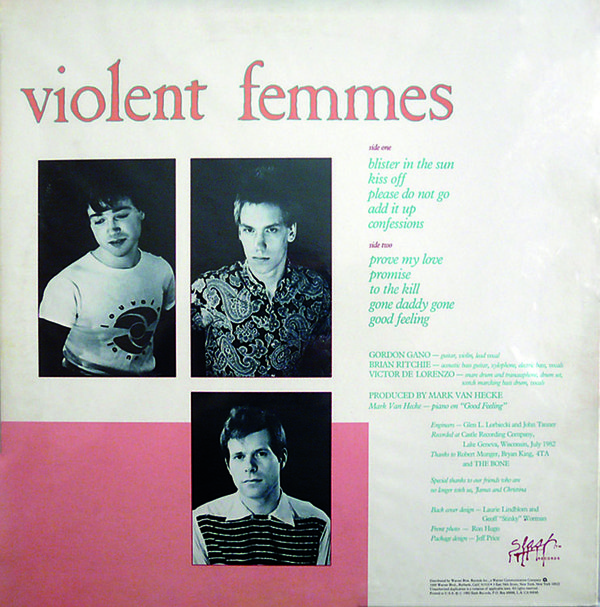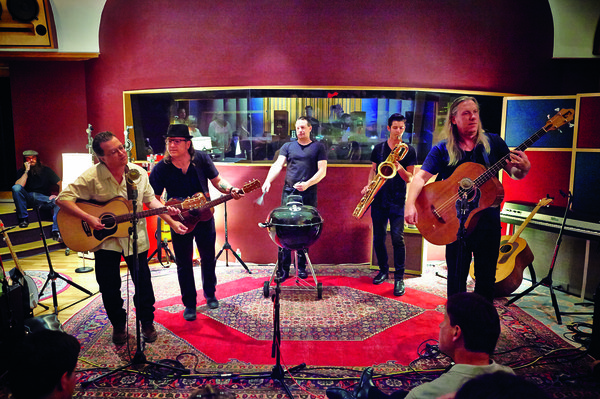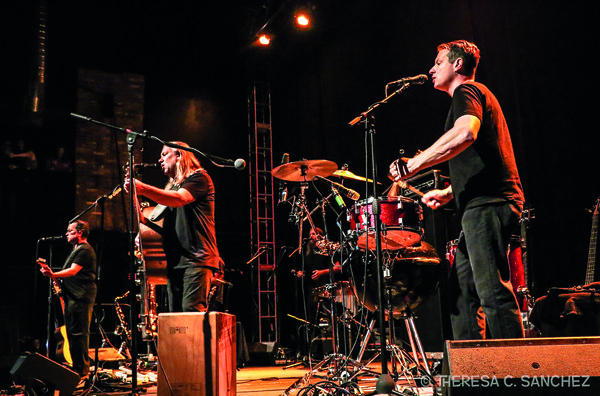Violent Femmes Debut

If you wanted to fill a compilation album with songs of adolescent angst, you wouldn't have too much trouble, particularly if you're a fan of guitar-based rock music. Call it 'Teenage Kicks', start with the title track, and off you go. But what would you pick for its album equivalent? Is there a long-playing record that sums up the experience of being a disaffected, angry and unloved teenager in the modern world, particularly the male of that particular species?
Violent Femmes' self-titled debut is surely a very strong contender. Released in 1982, this Milwaukee trio's first statement to the world is a folk-punk classic of disarming and irresistible simplicity. You may not even think you know Violent Femmes' music, but I feel pretty confident that when confronted with the deathless three-note guitar riff that opens 'Blister In The Sun', you'll go, 'Aaaah, that song'.
Busking It
Bassist Brian Ritchie and drummer Victor DeLorenzo had formed the band as a busking rhythm section - and come up with the name - before singer and chief songwriter Gordon Gano joined them, bringing with him a bright bunch of songs. According to Gano, the trio were considered something of a joke around Milwaukee and struggled to get gigs. And that's one reason why Violent Femmes resorted to busking to the showgoers queueing outside Milwaukee's Oriental Theatre in August 1981, waiting for the doors to open at that night's concert by The Pretenders.
This turned out to be a good idea. The Anglo-American band's late guitarist James Honeyman-Scott saw them and liked what he heard, and after inviting the rest of his band out to have a look, Violent Femmes were asked to play a few songs after the opening act had finished their set. It didn't end up being quite the 'big break' that folklore tells us every artist must have, but it gave the group the confidence that they weren't just wasting their time.
 The trio
on the
rear sleeve of
the album
The trio
on the
rear sleeve of
the album
Bills To Pay
Violent Femmes were still without a record deal, but indie label Shake Records showed interest in releasing an album, and booked studio time with producer Mark Van Hecke at Castle Studios in Lake Geneva, Wisconsin in July 1982. The record deal fell through, however, after the label owner became ill and needed the money for medical bills, but the band's self-belief was now sufficiently boosted to prompt them to go it alone. Drummer Victor DeLorenzo managed to borrow $10,000 from his father to pay for them to retain the studio time and make the record as planned.
Yet even after emerging with the finished album, producer Mark Van Hecke found the industry ambivalent about the trio. 'A lot of people thought I was nuts and this was s**t. I knew it wasn't', he would say later.
Fortunately, another influential fan began to shout about them shortly afterwards when New York Times music critic Robert Palmer wrote enthusiastically about the Femmes opening for Richard Hell at New York's Bottom Line and CBGB's in August 1982. He compared their sound to 'the discursive, rambling structures of folk-era Dylan'.
With industry interest duly piqued, the band were signed to Warner Music's offshoot Slash records. It persuaded the group to delay the release of their already recorded debut album until April 1983, so it could add some marketing and PR momentum.
On the face of it, the PR push didn't have much effect. The Violent Femmes failed to make the Billboard Top 200 on release, even if it did receive a smattering of positive reviews. Indeed, JD Considine in Rolling Stone magazine found that it 'not only acts like it just reinvented rock 'n' roll, but somehow manages to sound like it as well'.
 The
group
play for WFUV
Public Radio
Marquee
Members
at Electric
Lady Studios
in New York
in June
2016 with
drummer
John Sparrow
The
group
play for WFUV
Public Radio
Marquee
Members
at Electric
Lady Studios
in New York
in June
2016 with
drummer
John Sparrow
Teen Spirit
Such praise translated into little in the way of record sales at the time, but it would gradually resonate with generations of like-minded souls, and those songs still impact formidably today.
The musical hybrid they created was undoubtedly pretty original back then - even if comparisons to Jonathan Richman's naïve artistry were understandable. Ritchie's lively, hyperactive acoustic bass runs, DeLorenzo's stand-up drums and Gano's untutored teenage whine made for an urgent lo-fi assault whose jittery feel seemed to perfectly reflect the nervous energy framing the latter's adolescent paeans, laments and diatribes.
'It's all written when I was 15 to 17 years old and then recorded at 17 or 18', Gano told The Los Angeles Daily News in 2023. It also expresses itself in a slightly clumsy vernacular that adds to its uniqueness. Opener 'Blister In The Sun', for instance, benefits from the kind of ear-pricking lines that leave listeners pondering just what exactly he's referring to - and jumping to some suitably outré conclusions.
'Somebody was asking me about that song', Gano recalled, 'and said something like, "Well, you know… what that song's about." I'm like, "No. What are you talking about?" And they told me the song was about autoeroticism. I had never thought of that. But I can see where people could get that idea'.
And what about the possible allusions to drug abuse ('I'm so strung out/I'm high as a kite. I just might stop to check you out.')? 'I don't think anybody likes that song because they think the lyrics are deep', surmised Gano.
 Black
and
white shot of
DeLorenzo,
Gano and
Ritchie, and
(right) Gano
and Ritchie
on stage in
2016 at The
Rams Head
Live! venue in
Baltimore
Black
and
white shot of
DeLorenzo,
Gano and
Ritchie, and
(right) Gano
and Ritchie
on stage in
2016 at The
Rams Head
Live! venue in
Baltimore
Simply Does It
The lyrics are unquestionably part of 'Blister In The Sun''s appeal, though, as they also are on another well-loved number from the album, 'Add It Up', where the singer's sulky rant - 'Why can't I get just one kiss (escalating of course to 'screw' and 'f**k' as the song progresses) captures the inept frustrations of teenage masculinity as bluntly and candidly as anyone could wish for - perhaps more so, in fact.
With punk at this time embroiled in an arms race of heaviness, with hardcore and oi peaking in popularity, Violent Femmes were taking the opposite approach, with a mostly acoustic sound and simple pop music articulating kidult themes. And although he might sound bratty and naive one minute, bitterly frustrated and on the verge of violence the next, Gano's words certainly had enduring impact.
'When somebody is a teenager, one doesn't think about, "Oh, I'm a teenager, and this is like some stage I'm going through"'. Gano told The Los Angeles Daily News. 'They think, "I'm grown and this is who I am, and this is how things are...", which I think is part of how the album has connected so strongly to a lot of people when they are in their teenage years… There's some ring of something authentic about it'.
There are also touches of wit and finesse woven into the album. For instance, Gano's tongue is undoubtedly in his cheek during the faux-heart-rending, melodramatic delivery of 'Please Do Not Go', when he even resorts to semi-comic falsetto, and the overstated maudlin quality of the opening lament of 'Kiss Off' at once captures and parodies the maudlin teen mindset.
 Brian Ritchie with his trademark Ernie Ball Earthwood acoustic bass
and (below) Gordon Gano on stage with Violent Femmes in 2006
Brian Ritchie with his trademark Ernie Ball Earthwood acoustic bass
and (below) Gordon Gano on stage with Violent Femmes in 2006
Bee'S Knees
There's so much charm to the music, too, such as the insistent xylophone figure that captures the ear on 'Gone Daddy Gone' and the sunny backing vocal hooks on 'Prove My Love'. And all the while, DeLorenzo's snare drum keeps the tension cranked and Ritchie's sing-song basslines also reel us in. Since the album's release, it has grown in reputation to the point where it has sold over a million copies. Yet Gano's reedy vocal style perhaps sounds less arresting today because it's a texture that has become commonplace across the indie-rock scene.
You can hear his timbre - 'like a bee in a plastic cup', as fan JK Rowling described it - echoed in vocalists such as Steve Malkmus of Pavement and Smashing Pumpkins' Billy Corgan, and you could even argue that artists like Axl Rose and Eminem wouldn't have been so readily accepted into the mainstream without acts such as Violent Femmes opening the door.















































